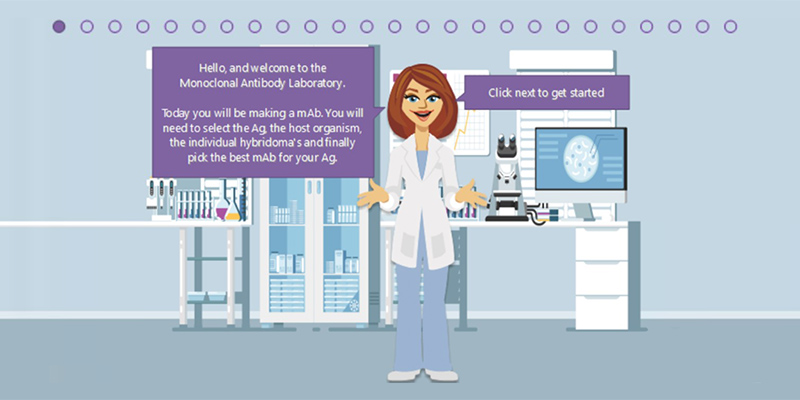Simple teaching simulations prove big asset for UniSA and beyond
By Dan Lander
 EDUCATIONDr Maurizio Costabile’s teaching simulations have attracted international attention.
EDUCATIONDr Maurizio Costabile’s teaching simulations have attracted international attention.In recent months, there has been plenty of attention on innovation inspired by the COVID-19 pandemic, as people have found new ways of doing all manner of things during life under lockdown.
For UniSA immunologist Dr Maurizio Costabile however, it was less a case of innovation and more one of adaptation, when digital teaching simulations he’d developed for face-to-face teaching proved ideal during the shift to online teaching – both for himself and other academics around the world.
“These are simple interactive, animated simulations, which I developed as a way to help students familiarise themselves with practical parts of their course without requiring all the resources of a lab,” Dr Costabile says.
“For example, one simulation that I created allows students to practice setting and reading a pipette, which can be quite confusing and was something students have struggled with for many years.
“After I introduced these sims into my face-to-face courses, I found a marked improvement – students understood the practical concepts from these sims, which only took up to 15 minutes to complete.”
When all UniSA teaching shifted online in March, Dr Costabile found his simulations allowed students to continue engaging remotely with a large part of their practical education, and their value was quickly recognised by colleagues near and far.
“I presented some of my simulations at a conference in San Diego last year, and recently an academic from Genoa in Italy saw my abstract and contacted me to ask if she could use them in her teaching while the country was in lockdown,” Dr Costabile says.
“Since then, I have also been contacted by other academics from The University of Adelaide and at the University of Otago in New Zealand with the same request.
“The feedback has been great – everyone thought the simulations worked really well, they were also able to give me a few hints and tips to make them even better, which is very welcome.”
With the help of UniSA’s Teaching Innovation Unit (TIU), Dr Costabile has been assisting other UniSA staff to adapt simulations to their courses, and he says the simplicity and flexibility of the software (Articulate Storyline) mean it has great potential across the institution.
“The basic idea is simple and very adaptable – it can be applied to almost any setting, and we have got the expertise level within the uni to help staff build these themselves and then mentor other staff in the process,” Dr Costabile says.
“The TIU has been fantastic in supporting me to develop these – Hayley Timms was instrumental in setting the sims up and bringing me up to required level of expertise level, and she has also worked with other staff as well.
“I have since been working with colleagues within the Clinical & Health Sciences unit who have taken this on board and made their own simulations, and I have collaborated with them to help them generate their own sims.
“So far, everyone has had really good student learning outcomes.”
Other Stories
- Excess coffee consumption a culprit for poor health
- We may well be able to eliminate coronavirus, but we’ll probably never eradicate it. Here’s the difference
- $10m fund helping students hardest hit by economic downturn
- Bittersweet celebration of nurses and midwives, 200 years after Florence Nightingale’s birth
- From the Vice Chancellor
- Achievements and Announcements
- Hawke’s legacy continues to grow as new materials added to archival collection
- Binge drinkers beware, Drunkorexia is calling
- Team effort creates ‘red dirt’ Anangu education space in the Adelaide Hills
- ‘Like looking for a needle in a haystack’: UniSA joins global hunt to find key molecule to block COVID-19
- Video: Hop aboard UniSA’s 737 flight simulator
- Simple teaching simulations prove big asset for UniSA and beyond
- Adjunct Professor John Wardle receives highest national architecture accolade
- The latest book from UniSA researchers
- In Pictures: Teal raises awareness for ovarian cancer




